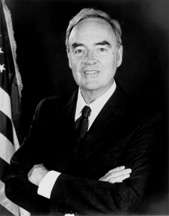United States Senate special election in Pennsylvania, 1991
| | |||||||||||||||||||||||
| |||||||||||||||||||||||
| |||||||||||||||||||||||
|
| |||||||||||||||||||||||
| County results | |||||||||||||||||||||||
| |||||||||||||||||||||||
The 1991 United States Senate Special election in Pennsylvania was held on November 5, 1991. Incumbent Democratic U.S. Senator Harris Wofford won the special election that was held because of the death of Republican Senator John Heinz on April 4 of that year. Wofford was appointed by Governor Bob Casey to serve as Senator until the special election which he subsequently won. Major-party candidates for this election were chosen by party committees, as the vacancy had happened too late for a primary to be held.
Major candidates
Democratic
- Harris Wofford, incumbent U.S. Senator and former State Secretary of Labor
Republican
- Dick Thornburgh, former Governor and U.S. Attorney General
Campaign
House Majority Whip William H. Gray was a potential candidate for the Democrats, but he declined to run and surprisingly resigned from Congress in 1991 to serve as President of the United Negro College Fund from 1991 to 2004. The move was considered a complete surprise and prompted questions as to why he had done so. There was widespread speculation that he had been the subject of an investigation into alleged campaign finance irregularities and a grand jury investigation into his church's financial dealings. He was reported to have struck a deal with Republican Dick Thornburgh, the United States Attorney General and former Governor of Pennsylvania, that he would not run in the special election and in return Thornburgh would drop the investigation into him. Thornburgh went on to run but lost in an upset to Democrat Harris Wofford.[1][2][3][4][5]
Wofford's win was impressive because as little as 5 months before the election, polling showed him to be trailing Thornburgh by upwards of 40 points. Both the state and national Democratic establishment was tepid toward Wofford's campaign, feeling that Governor Casey had missed a prime opportunity to select a top tier candidate and had instead created a situation where Republicans would take back the seat just months after losing it. In conjunction with his fundraising issues, Wofford also had difficulty communicating his message to the voters; because he had a bureaucratic as opposed to a political background, he spoke in a somewhat long-winded manner that received criticism in the media. With his large lead in the polls, Thornburgh laid back to avoid mistakes, which allowed Wofford to gain traction. Despite his elite upbringing, Wofford connected well with working class voters as he made access to healthcare a huge plank of his campaign. He also successfully derided Thornburgh for his connections to the president, as Bush's popularity was steeply declining due to a recession.[6]
Thornburgh was unable to mount credible attacks against Wofford until after the Democrat had already established himself. As a result, Wofford was not only victorious in traditionally Democratic areas, such as Philadelphia city, Scranton, and metro Pittsburgh, but he also ran well in GOP strongholds. Wofford won three of the four suburban Philadelphia counties, which, although socially liberal, were strongly aligned with Republicans; the "roll-up-your-sleves" style campaign ran by Wofford also allowed him to perform stronger than most Democrats in rural regions and to even win several usually Republican counties with a strong labor base.[6]
Results
Democrats did very well across the state including in Allegheny County (Pittsburgh) and Philadelphia County (Philadelphia).
| Party | Candidate | Votes | % | ± | |
|---|---|---|---|---|---|
| Democratic | Harris Wofford (Incumbent) | 1,860,760 | 55.01% | +22.56% | |
| Republican | Dick Thornburgh | 1,521,986 | 44.99% | -21.46% | |
| Majority | 338,774 | 10.01% | -23.99% | ||
| Totals | 3,382,746 | 100.00% | |||
References
- ↑ "Did Dick Cut Bill A Deal? Book: Thornburgh Had Goods On Gray - Philly.com". Articles.philly.com. 2011-03-25. Retrieved 2013-07-26.
- ↑ Moore, Alexis (1991-06-20). "Why Would Gray Resign? Several Ideas Are Floated - Philly.com". Articles.philly.com. Retrieved 2013-07-26.
- ↑ "Thornburgh Aide Linked to Gray Leak : Congress: A Justice Department probe says the chief spokesman and an ex-FBI official confirmed a damaging report on House Democratic leader. - Los Angeles Times". Articles.latimes.com. 1990-04-20. Retrieved 2013-07-26.
- ↑ Stone, Chuck (1990-06-13). "Editorials & Opinion | The Conniving Ways Of Dick Thornburgh | Seattle Times Newspaper". Community.seattletimes.nwsource.com. Retrieved 2013-07-26.
- ↑ Black Americans in Congress, 1870-2007 - Google Books. Books.google.co.uk. 2012-08-27. Retrieved 2013-07-26.
- 1 2 Kennedy, John J. (2006). Pennsylvania elections : statewide contests from 1950-2004. Lanham, Md.: University Press of America. pp. 68—70. ISBN 0761832793.



